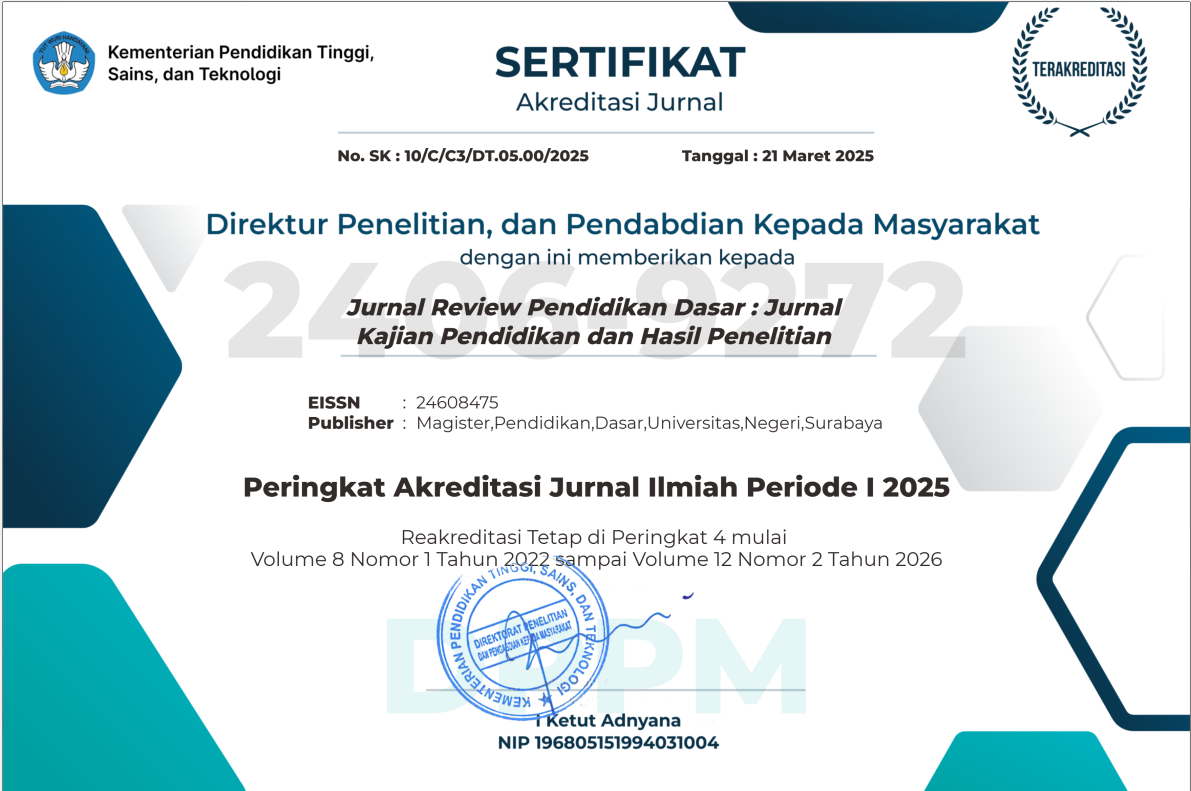Hubungan antara Asesmen Kompetensi Minimum dan Kemampuan Berpikir Tingkat Tinggi pada Pembelajaran Matematika Siswa Kelas V SDN Jember Lor 03
DOI:
https://doi.org/10.26740/jrpd.v10n3.p187-196Keywords:
higher order thinking skills,, mathematics learning,, minimum competency assessment,Abstract
This research is correlational research with product moment correlation analysis. This research uses quantitative methods using test instruments and documentation data from AKM simulation results. The aim of this research is to determine whether or not there is a relationship between the Minimum Competency Assessment and Higher Level Thinking Skills in Mathematics Learning for Class V Students at SDN Jember Lor 03. The research was carried out at SDN Jember Lor 03, Jember Regency. The subjects of this research were 82 class V students. The data analysis technique used was product moment correlation analysis. The correlation coefficient result is 0.478 which is greater than the r-table value of 0.213 so that the research results show that there is a positive and significant relationship between the minimum competency assessment and high-level thinking abilities in class V students and the results. The resulting determinant coefficient is 23%, meaning that the minimum competency assessment variable influences high-level thinking abilities by 23% and the remainder comes from other factors in the form of internal factors, namely the level of intelligence, intelligence, attention, interest, talent, motivation and readiness of students, external factors that influence including teaching methods, teacher and student relations, school programs and teaching facilities
References
Anderson, L. W. dan M. C. Krathwohl. (2001). A Taxonomy for Learning, Teaching and Assesing. New York: Longman.
Arikunto, S. (2013). Prosedur Penelitian : Suatu Pendekatan Praktik. Jakarta: Rineka Cipta.
Arikunto, S. (2009). Manajemen Penelitian. Jakarta: Rineka Cipta.
Fauzia, M. (2022). Hubungan Penggunaan Soal Berbasis AKM dan Hasil Belajar Siswa. Jurnal Edulab : Majalah Ilmiah Laboratorium Pendidikan, 3(2): 1-7.
Hajar, Y. (2018). Analisis Kemampuan Higher Order Thinking (HOT) Siswa SMP Negeri di Kota Cimahi. Jurnal Pembelajaran Matematika Inovatif. 3(1): 453-458. http://dx.doi.org/10.22460/jpmi.vli3.p453-458
Masyhud, M.S. (2021). Metode Penelitian Pendidikan Penuntun Teori dan Praktik Penelitian Bagi Calon Guru, Guru, dan Praktisi Pendidikan. Jember: Lembaga Pengembangan Manajemen dan Profesi Kependidikan
Meriana , T., dan E. Muniarti. (2021). Analisis Pelatihan Asesmen Kompetansi Minimum. Jurnal Dinamika Pendidikan. 1(3): 110-116. https://doi.org/10.51212/jdp.v14i2.7
OECD. (2019). PISA 2018 Assesment and Analytical Framework. Paris: OECD Publishing
Pusmenjar Kemendikbud. (2021). Asesmen dan Implikasinya dalam Pembelajaran. Jakarta : Balitbang, Kemendikbud
Sani, A. R. (2019). Strategi Belajar Mengajar. Depok: Rajawali Press
Sherly., Herman, dan F. Halim. (2021). Sosialisasi Implementasi Program Profil Pelajar Pancasila di SMP Swasta Sultan Agung Pematangsiantar. Jubaedah: Jurnal Pengabdian dan Edukasi Sekolah. 1 (3): 282-289.
Teresia, W. (2021). Asesmen Nasional 2021. Jakarta: Guepedia
Tim Substansi Asesmen Akademik. (2021). Framework Asesmen Kompetensi Minimum (AKM). Jakarta: Balitbang Kemendikbud
Downloads
Published
How to Cite
Issue
Section
License
Copyright (c) 2024 Jurnal Review Pendidikan Dasar : Jurnal Kajian Pendidikan dan Hasil Penelitian

This work is licensed under a Creative Commons Attribution 4.0 International License.
 Abstract views: 345
,
Abstract views: 345
, PDF Downloads: 230
PDF Downloads: 230




